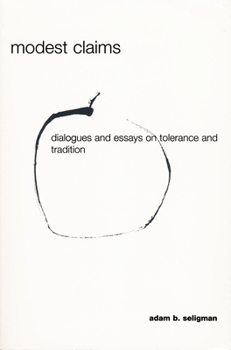Modest Claims: Dialogues and Essays on Tolerance and Tradition
Select Format
Select Condition 
Book Overview
Many of the critical political issues of our time--from the 1992-1995 Balkan Wars to the continuing crisis in the Middle East to the role of Muslim immigrants in Western Europe--revolve around issues of religion and tolerance. The predominant approach to these concerns is to espouse the doctrines of liberal humanistic virtue. These doctrines, however, fail to resonate in communities that maintain more traditional religious definitions of self and society.
Modest Claims, which features essays by Seligman and dialogues between scholars representing the three monotheistic faiths, provides the beginnings of a very different set of arguments on tolerance and tradition. In so doing it seeks to uncover the sources of toleration and pluralism that exist within the traditions of Judaism, Christianity, and Islam. Most contemporary approaches leave these sources largely unexplored and often marginalize them in current public debates and social agendas. Seligman and his dialogue partners seek to engage traditional understandings to uncover internal components that make dialogue between different religions and cultures possible. Espousing the idea of translation as a metaphor for the tolerant act, Modest Claims takes difference seriously as an aspect of existence that can be neither trivialized nor ignored. It explores and develops specifically religious arguments for tolerance and acceptance of others, as well as new strategies for understanding difference that are not rooted in individualist worldviews.
This important and timely book breathes new life into the search for peace and toleration in an increasingly fractured world.





